Courses Paid courses Dyspraxia and Motor Coordination Difficulties
Dyspraxia and Motor Coordination Difficulties
| Achieve a certificate |
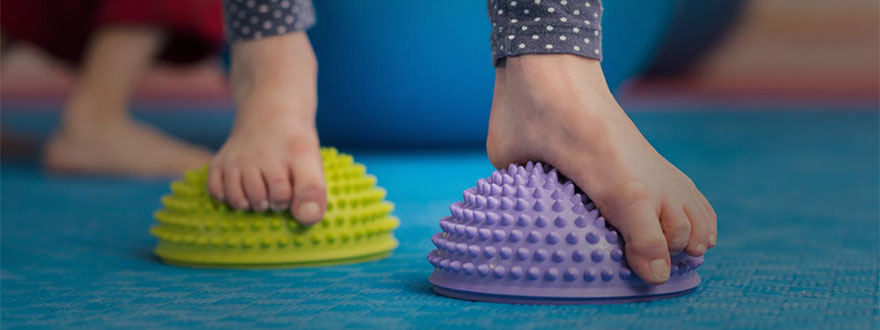
In many classrooms there are learners who have difficulty with planning and carrying out movements. These learners may have motor coordination skills and balance difficulties, also known as developmental coordination disorder or dyspraxia. Children and young people with dyspraxia may seem clumsy or accident prone. They may have difficulties with fine motor skills, such as writing, or gross motor skills, such as running. Living with MCD can be very challenging especially if there is a co-occurring need such as speech and language difficulties, challenging behaviours and accurate word reading and spelling difficulties.
The course content relates to learners in compulsory education (4-18 years), however, the theory and many of the assessment and intervention strategies can be contextualised and implemented in an early years setting too. You will learn how to assess the needs of a learner and go on to develop a support plan consisting of SMART goals and interventions, which you will implement and later review to determine how well it has met the learner’s specific developmental needs.
This course responds to the information needs of the whole community centred around supporting the child/young person with motor coordination difficulties. Parents and carers benefit from raised awareness of their child’s needs. Advisory teachers, therapists and educational psychologists gain access to evidence-based CPD resources that can be used to strengthen capacity in their local authority and schools. Schools can use this course to train individuals or groups of teachers and teaching support staff as part of a school’s improvement plan or a whole-school initiative. NQTs/RQTs also build a secure knowledge of the graduated approach at the start of their career.
Course learning outcomes
On successful completion of the course, you will be able to:
- recognise and describe the main features of motor learning difficulties
- describe, using correct terminology, the difficulties learners can have in planning and carrying out movement
- identify the characteristics and range of impairments associated with motor coordination difficulties
- refer children for motor assessment to the appropriate multi-professional teams
- use checklists to carry out observations of a child’s motor skills
- apply a graduated response to meeting the needs of learners with motor difficulties using the assess, plan, do review cycle
- employ strategies that enable learners to build and master motor skills
- modify tasks, alter expectations and change the classroom environment to help learners meet with success
- make reasonable adjustments in social and sporting activities to maximise the inclusion of learners with motor difficulties
- create a support plan for a pupil/group of pupils in your school
Our courses are structured into four sections. Click on the section headings to reveal page titles and some example content.
Learn about the characteristics and range of impairments associated with motor coordination difficulties and experience the difficulties learners can have in planning and carrying out movement.
- Section objectives
- Understanding motor coordination difficulties
- Motor skills
- Definitions and terminology
- What else has it been called? Clumsy child syndrome…
- Praxis - the basis of action, ideation, motor planning, execution, feedback
- What is praxis?
-
How do motor learning difficulties happen?
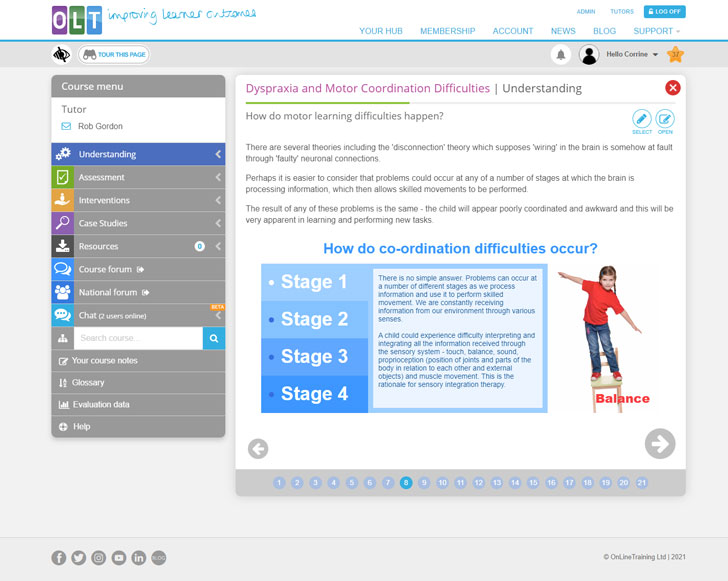
Screenshot from Understanding page 8 - Who is affected?
- Characteristic features
- Physical characteristics
-
Dressing / undressing
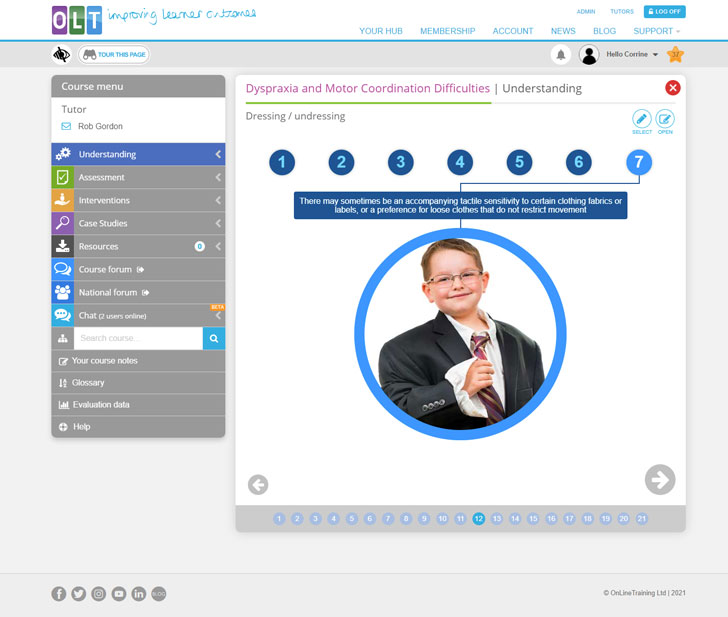
Screenshot from Understanding page 12 - Feeding and eating
- Handwriting
- Emotional and behavioural characteristics
- Other characteristics
- Popular misconceptions
- Medical causes or motor coordination problems
- Why do anything about it?
- End of section quiz
- Section summary
Explore the main types and purposes of assessment, and use checklists to carry out observations. Understand how and when to refer children to multi-professional teams for motor assessment.
- Section objectives and your learner’s profile
- What is assessment?
- Types of assessment
- The role of professionals in assessment
-
The role of the teacher in assessment
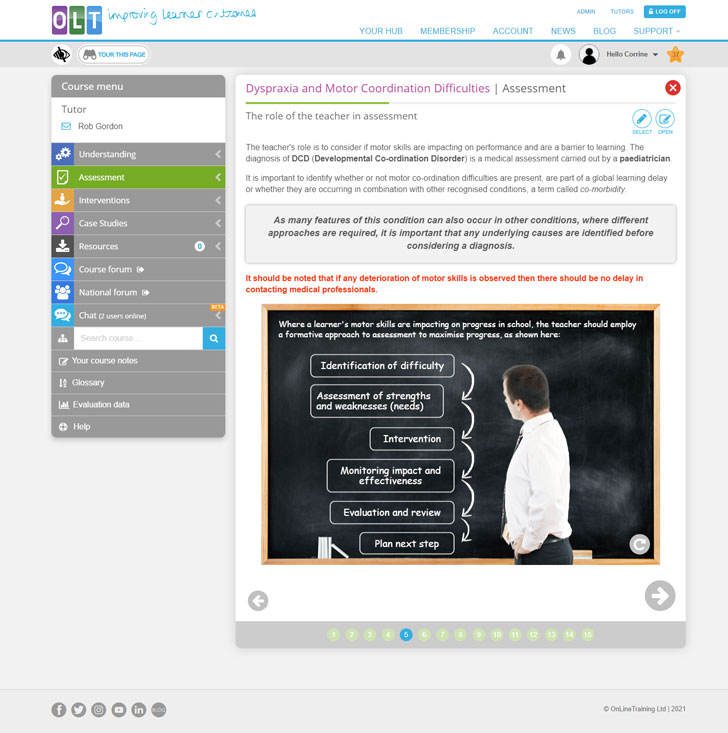
Screenshot from Assessment page 5 - Effective assessment for learning
- A developmental approach
- Expected developmental milestones
- Checklists
- Other difficulties
- Course assignment: Your learner’s three SMART goals
-
Assessment record form
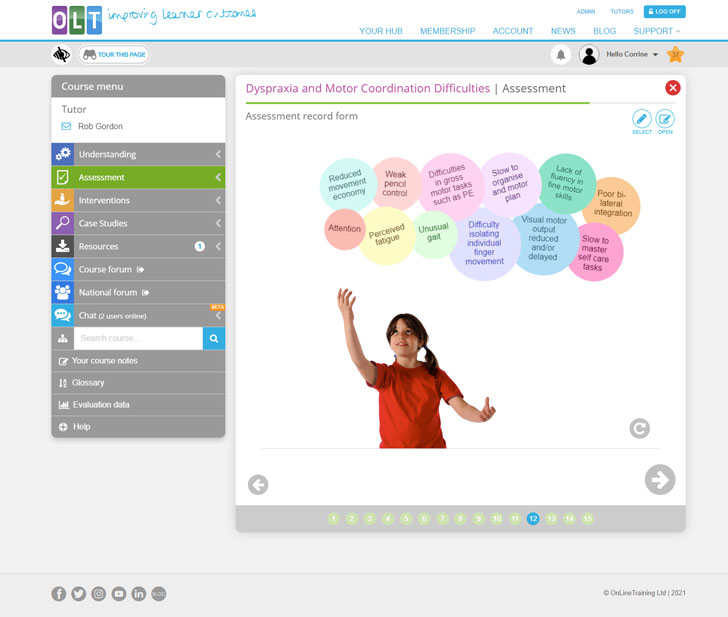
Screenshot from Assessment page 12 - Voice of the child
- End of section quiz
- Section summary
Learn strategies to enable learners to build and master motor skills and understand how to modify tasks and the classroom environment to help them succeed.
- Section objectives
- Introduction
- The acquisition of motor skills
- Teaching motor skills
-
Fine motor skills – getting seating posture right
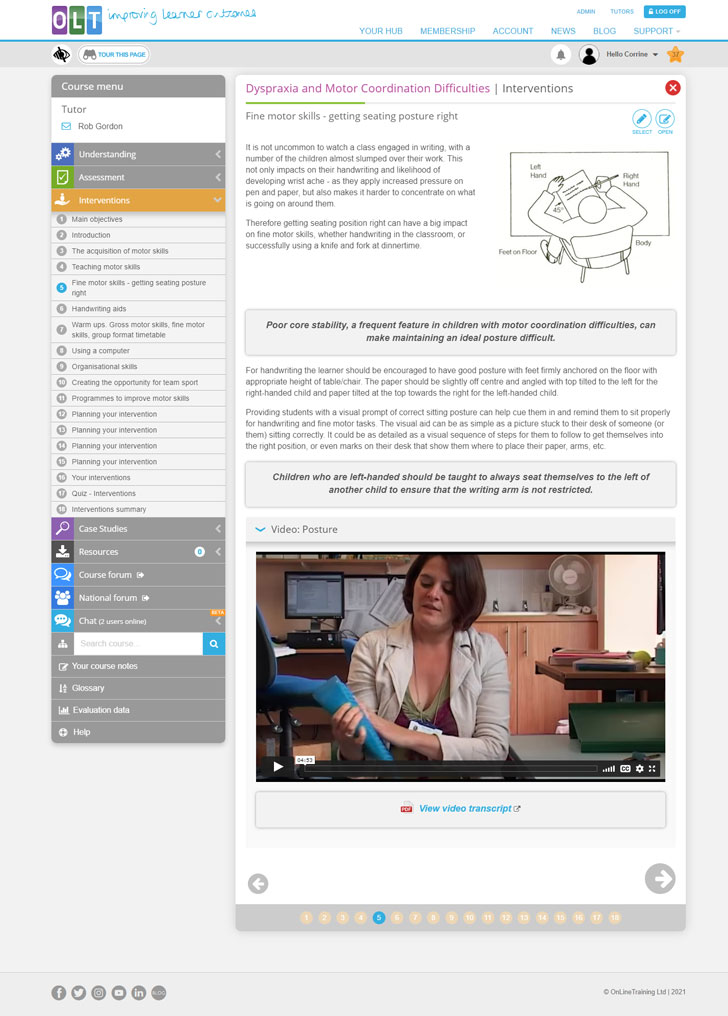
Screenshot from Interventions page 5 - Handwriting aids
- Warms ups. Gross motor skills, fine motor skills, group format timetable
- Using a computer
- Organisational skills
- Creating the opportunity for team sport
- Programmes to improve motor skills
- Planning your intervention (Part 1)
- Planning your intervention (Part 2)
-
Planning your intervention (Part 3)
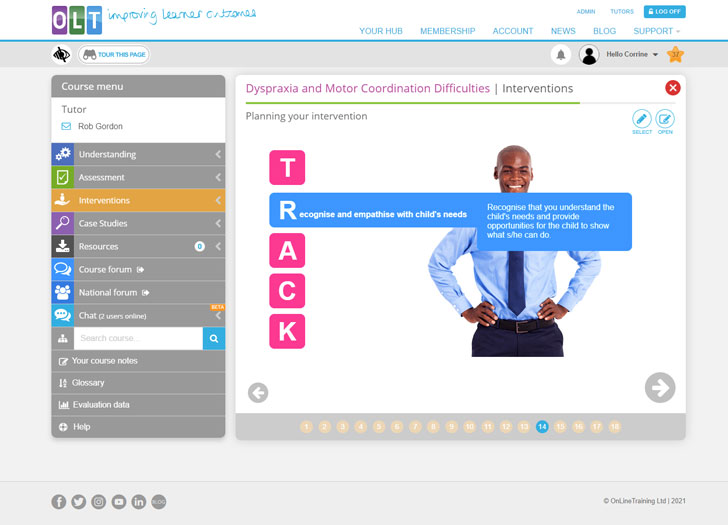
Screenshot from Interventions page 14 - Planning your intervention (Part 4)
- Course assignment: Your learner’s three interventions
- End of section quiz
- Section summary
View real examples that illustrate the needs of the individual, the interventions implemented and their resulting progress.
- Case study: Storrington First School
- Case study: Nightingales Clinic
- Case study: Summerlea
I have become more aware of children' s difficulties and what interventions you could use for them.
Qualified Teacher (30/03/2021)
I was able to identify an area of difficulty in a student diagnosed with Dyspraxia and set a SMART goal to provide support in this area. He has already shown some improvements with organisation skills. This training has improved my knowledge and understanding in this area which in turn has improved my confidence in carrying out my role within school.
Teaching Assistant (17/01/2021)
This training has been very useful, I am particularly interested in adding more information to my Autism training notes. I feel more confident to talk about the motor coordination difficulties of CYP with an Autism diagnosis and will feed into the profiling of a young person. The training will have a big impact on my role as Advisor when it comes to talking about whole school adaptions and interventions. I am working with a pupil who currently has a Dyslexic profile and possible motor coordination difficulties, my next steps will be to approach the case with Motor coordination specs on using the assessment tools in the resources as a starting point.
EP (27/08/2020)
Due to the current covid conditions, rules and regulations I have not been able to put things into physical practice. However, I am very happy with how the course has gone, what it has taught me and am confident I will be able to put together some good interventions to helps those children who need our help
Teaching Assistant (25/08/2020)
To plan my next steps (with an individual or a group) To help give effect on their academic achievements . . .. .t has given me the opportunity to evaluate progress against the outcomes. To develop intervention programmes to suit a childs needs
Teaching Assistant (07/08/2020)
Personally the training has given me a greater understanding and recognition of children who have motor coordination difficulties and what they face. When you know what they (and the parents) are facing it gives you a better basis on how to help them and ensure a more positive outcome. The training has also helped in the various strategies that can be implemented within the school setting. The notes are something I can refer to which is also a great help. I have found this training very interesting and informative.
Teaching Assistant (23/07/2020)
I have improved in confidence with creating SMART targets following assessment and suggesting specific strategies of intervention to support children to meet their SMART targets.
Other Position (23/07/2020)
This training as made me more confident in identifying the pupils difficulties and the impact this can have on their everyday life. Setting SMART targets has made me realise how important it is to be very clear with expected outcomes and how these can be measured.
Other Position (22/07/2020)
Due to the current Corvid 19 situation, I have not been able to put some of the additional knowledge I have gained into practice. I hope following this situation I will have the extra knowledge and confidence in supporting schools with pupils that have motor co- ordination difficulties.
Other Position (09/07/2020)
It has given me the confidence in my convictions. I had a historic knowledge, but it has confirmed and reminded me of previous knowledge and experience, I can now confidently share without any doubts.
Teaching Assistant (26/06/2020)
Although I am an experienced TA, it was nice to still learn new strategies and listen to others experiences without being judged. I can’t wait to get back into school to practise and show the new confidence I have gained. It's also great to know that the course resources will still be available for a while so I can give myself a quick reminder when schools return! Thank you!!
Teaching Assistant (22/05/2020)
I now have a wealth of ideas to put into place with pupils. I had not heard of the jump ahead programme, So I will look into that in more detail to see if it can be introduced.
Advisory Teacher (11/05/2020)
| Rating |
| |
Delivery
|
| |
20 hours, 1-2 hrs per week |
| |
Flexible start date |
| |
Assignment
|
Licences
Your school or education system can purchase a licence to deliver our courses.
Contact us to find out moreCertification
20 hrs CPD Certified What's this?
Certificate of Achievement

